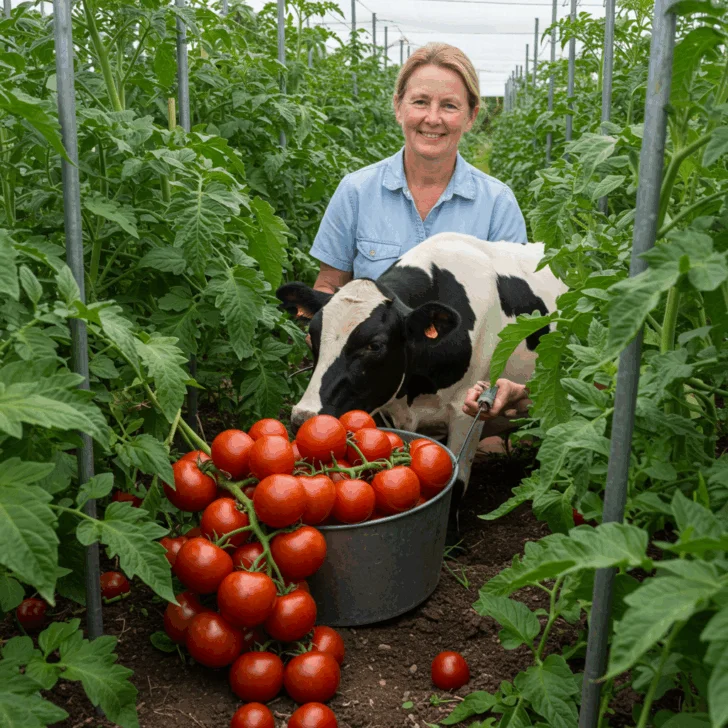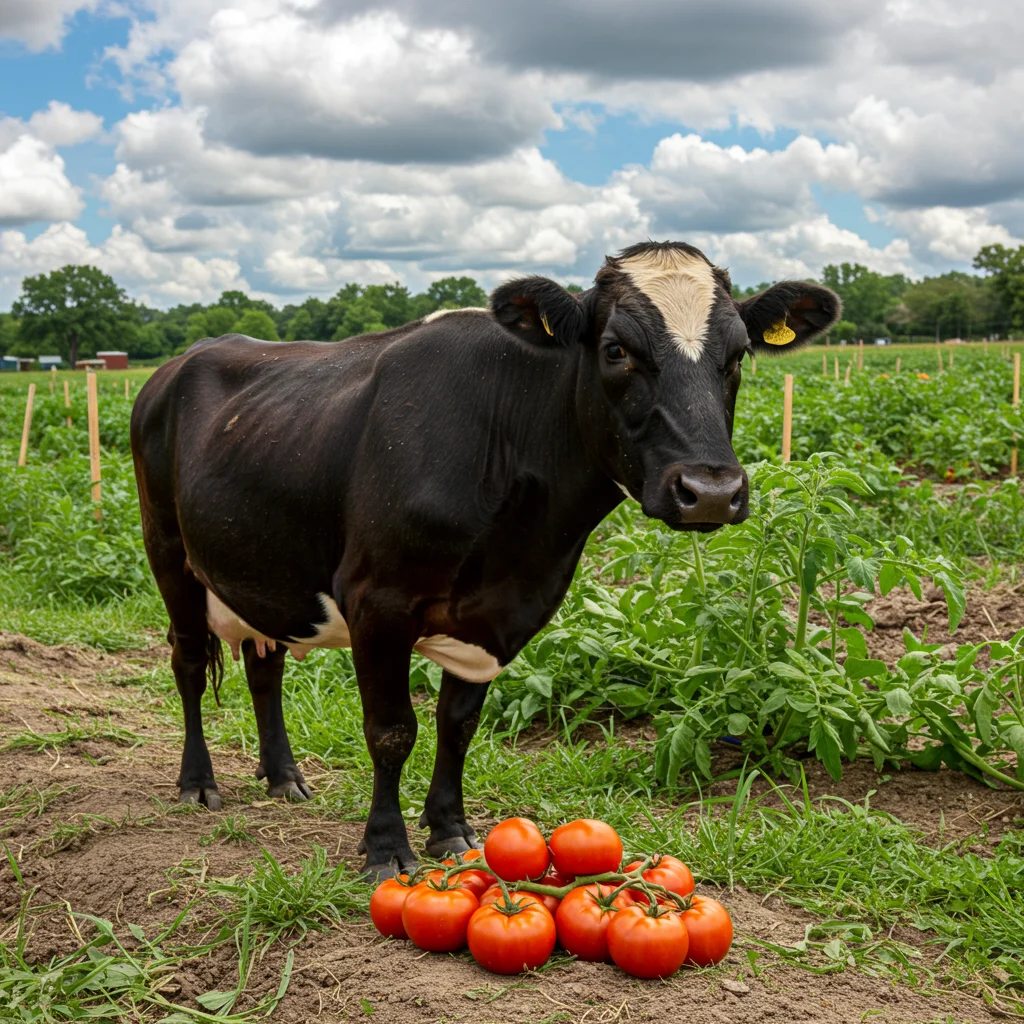This guide explores the benefits and methods of using cow manure as a fertilizer for your tomato plants, covering everything from composting to application techniques for healthy, thriving plants.

Introduction: Nourishing Your Tomatoes Naturally
Tomato plants are heavy feeders, requiring nutrient-rich soil to produce a bountiful harvest. While synthetic fertilizers offer a quick fix, many gardeners prefer natural solutions like cow manure for a more sustainable and eco-friendly approach. Cow manure is a rich source of essential nutrients that can significantly boost tomato plant growth and yield. This guide will delve into the advantages of using cow manure, how to prepare it properly, and the best application methods for optimal results.
JUMP TO TOPIC
The Benefits of Cow Manure for Tomatoes
Cow manure offers a wealth of benefits for tomato plants:
Enhanced Soil Structure
- Improved Drainage and Aeration: Cow manure adds organic matter to the soil, improving its structure and allowing for better drainage and aeration. This helps prevent root rot, a common problem in heavy, compacted soils.
- Increased Water Retention: The organic matter in cow manure also enhances the soil’s ability to retain water, reducing the need for frequent watering. This is especially beneficial in dry climates or during periods of drought.
Nutrient-Rich Fertilizer
- Essential Macronutrients: Cow manure is rich in nitrogen (N), phosphorus (P), and potassium (K), the three primary macronutrients crucial for plant growth. Nitrogen promotes healthy foliage, phosphorus supports root development, and potassium contributes to overall plant health and fruit production.
- Micronutrient Boost: Besides macronutrients, cow manure also provides essential micronutrients like calcium, magnesium, and sulfur, further contributing to healthy tomato plant development.
Sustainable Gardening Practice
- Environmentally Friendly: Using cow manure reduces reliance on synthetic fertilizers, minimizing the environmental impact associated with their production and use.
- Soil Health Improvement: Regularly amending your garden soil with cow manure improves its overall health and fertility in the long term, creating a sustainable gardening ecosystem.
Preparing Cow Manure for Your Tomato Plants
Using fresh cow manure can be detrimental to plants due to its high nitrogen content and potential to burn roots. Proper preparation is essential:
Composting Cow Manure
- The Composting Process: Composting cow manure allows it to break down into a more stable and beneficial form for plants. This involves mixing the manure with other organic materials like leaves, straw, and garden waste, and allowing it to decompose over several months.
- Benefits of Composted Manure: Composted cow manure is safer for plants, as the composting process reduces the risk of nitrogen burn. It also eliminates harmful pathogens and weed seeds that may be present in fresh manure.
Aged Cow Manure
- Aging Process: Another option is to simply age the cow manure. Allow the manure to sit in a pile for at least six months, allowing it to decompose naturally. Turning the pile occasionally accelerates the aging process.
- Using Aged Manure: Aged manure still retains valuable nutrients and is less likely to harm plants compared to fresh manure.
Applying Cow Manure to Tomato Plants
There are several ways to apply cow manure to your tomato garden:
Pre-Planting Application
- Amending the Soil: Before planting your tomatoes, incorporate composted or aged cow manure into the soil. This enriches the planting area and provides a slow-release fertilizer throughout the growing season.
- Quantity: A general guideline is to add 2-4 inches of well-rotted manure per 100 square feet of garden bed, mixing it thoroughly into the top 6-8 inches of soil.
Side-Dressing
- Application Method: Side-dressing involves applying cow manure around the base of the tomato plants during the growing season. This provides a supplemental nutrient boost as the plants develop.
- Frequency: Side-dress with aged or composted manure every 4-6 weeks during the growing season.
Using Cow Manure Tea
- Brewing Manure Tea: Cow manure tea is a liquid fertilizer created by steeping cow manure in water. This method allows for quick nutrient absorption by the plants.
- Application: Apply cow manure tea to the soil around the base of your tomato plants. Be sure to dilute the tea appropriately to avoid nitrogen burn. (See relevant resources for dilution ratios).
FAQs about Using Cow Manure for Tomatoes
Q: Can I use fresh cow manure directly on my tomato plants?
A: No, fresh cow manure can burn the roots of your tomato plants due to its high nitrogen content and potential pathogens. It’s crucial to compost or age the manure before application.
Q: How much cow manure should I use for my tomato plants?
A: A good rule of thumb is 2-4 inches of well-rotted manure per 100 square feet of garden area, mixed into the top 6-8 inches of soil before planting.
Q: How often should I apply cow manure during the growing season?
A: If side-dressing, apply aged or composted cow manure every 4-6 weeks.
Q: Where can I get cow manure?
A: Local farms, garden centers, and some municipalities offer cow manure. Be sure to inquire about its age or composting status.
Conclusion: Reaping the Rewards of Natural Fertilization
Using cow manure for your tomato plants is a rewarding practice that offers significant benefits for both your garden and the environment. From enriching the soil to boosting plant growth and yield, cow manure provides a natural and sustainable way to cultivate healthy, thriving tomato plants and enjoy a bountiful harvest. By following the guidelines outlined in this guide, you can successfully utilize this valuable resource to nurture your tomatoes and savor the delicious fruits of your labor.
Authoritative Sources
This expanded and optimized content provides comprehensive information on using cow manure for tomato plants while adhering to the provided guidelines. You can further enhance this by including images and videos illustrating the various steps outlined.

